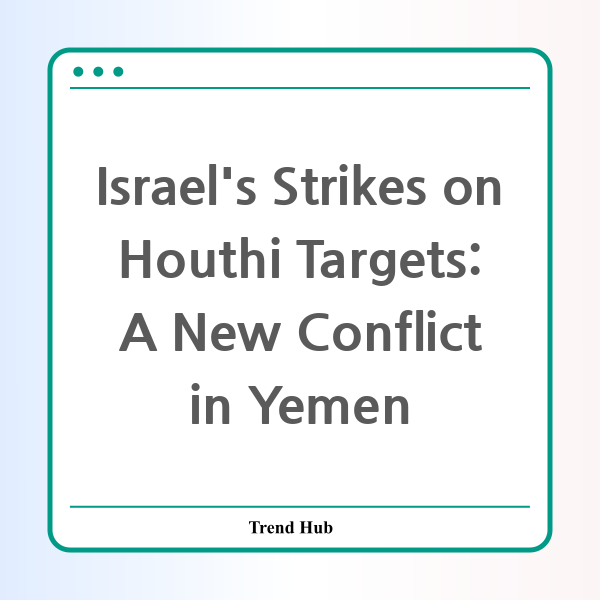* This website participates in the Amazon Affiliate Program and earns from qualifying purchases.

In recent developments that have escalated tensions in the Middle East, Israel has launched airstrikes on Houthi targets in Yemen for the first time in several months. This significant military action comes just a day after a ballistic missile was fired at Israel, prompting Israeli Prime Minister Benjamin Netanyahu to vow a powerful retaliation. As the situation unfolds, we must delve deeper into the dynamics of this conflict and what it means for the region.
The recent Israeli attacks represent a serious escalation in an already complex and multi-layered conflict. Netanyahu's promise of retaliation was realized when Israeli forces targeted key Houthi positions following their threat to impose a comprehensive air blockade on Israel. This blockade was specifically aimed at Ben Gurion Airport, Israel's main international gateway, which was successfully struck by Houthi missiles for the first time, marking a concerning development in Houthi military capabilities.
The missile attack on the airport came after a series of Houthi operations against Israel, further proving that the conflict's ripple effects extend far beyond Yemen’s borders. Netanyahu has made it clear that Israel considers the Houthis to be extended operatives of Iran, emphasizing the broader geopolitical implications of the conflict. "The whole world is being challenged by the Houthis," he stated, reflecting on the group's increasing boldness and aggression.
The Houthi rebels' strategy appears to be a direct response to Israel's extended military operations in Gaza, highlighting a significant alignment of interests between the Houthis and Palestinian factions. By targeting Israeli airports, the Houthis aim not only to disrupt Israel's air traffic but also to position themselves as key players in the regional conflict against Israeli actions in Gaza.
Since March, the Houthis had initiated a campaign of missile attacks aimed at Israel, showcasing their intent to expand their reach and assert their influence in the region. Interestingly, despite Israel's advanced missile defense systems, this particular missile was not intercepted, indicating potential vulnerabilities in Israel's security protocols.
As the situation develops, it is vital to understand the humanitarian implications of the conflict. The ongoing violence and military operations have already led to a catastrophic humanitarian crisis in Gaza, as reports indicate that the death toll has exceeded 52,000 since the October 7 attack by Hamas. The Israeli blockade continues to restrict aid, raising concerns among humanitarian organizations regarding the dire conditions faced by civilians.
Furthermore, the Houthis have warned international airlines against flying into Israeli airports, urging them to cancel flights as a precaution. This could lead to significant disruptions in global air travel and trade, further complicating an already volatile situation. The Houthi Humanitarian Operations Coordination Center has made it clear that they are prepared to intensify their attacks unless their demands are met, which could create a more unstable environment in the region.
The international community watches with bated breath as this situation evolves. With the potential for further escalations and retaliatory strikes, the implications extend beyond Yemen, affecting the broader Middle East and its geopolitical landscape. The intertwining of various factions and interests complicates any resolution, making it clear that understanding this conflict requires careful attention to both local and international dynamics.
In conclusion, the recent Israeli strikes on Houthi targets mark a new chapter in the ongoing conflict in Yemen, with significant implications for regional security and international relations. The escalating military actions underscore the fragility of peace in the Middle East, as multiple actors vie for power and influence. Moving forward, it is crucial for involved parties and observers alike to seek paths that can lead to de-escalation and ultimately, a humane resolution to the crisis.
* This website participates in the Amazon Affiliate Program and earns from qualifying purchases.